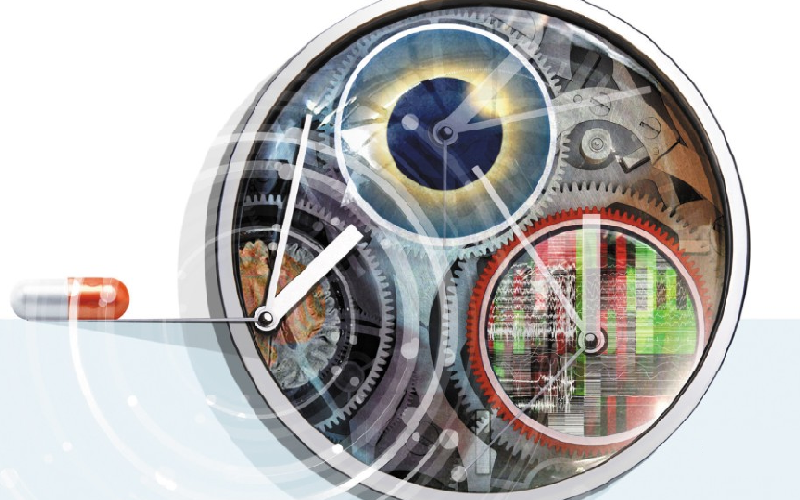In the evolving landscape of healthcare, the integration of chronobiology into personalized medicine emerges as a groundbreaking approach, reshaping our understanding of treatment and wellness. Chronobiology, the study of biological rhythms, unveils how our bodies’ internal clocks influence physiological processes and health outcomes. Here we explore the historical background of chronobiology, its profound impact on various diseases, and the revolutionary concept of chronotherapy, where treatments are timed to coincide with the body’s natural cycles.
Introduction to Chronobiology
In the dynamic world of healthcare, the pursuit of optimized and individualized treatment is constantly evolving. At the forefront of this evolution is the integration of chronobiology into personalized medicine. Chronobiology, the scientific study of biological rhythms, is revealing crucial insights into how our internal biological clocks affect health and disease.
Definition of Chronobiology
Chronobiology is a field of biology that studies periodic or cyclical phenomena in living organisms. These rhythms, known as biological rhythms, are fundamental to all life forms and range from the very short (like the cell cycle) to the very long (like seasonal or annual rhythms). Central to chronobiology is the understanding of circadian rhythms, which are approximately 24-hour cycles observed in many biological processes. These rhythms are not just responses to external environmental factors but are also driven by internal biological clocks.
Overview of Personalized Medicine
Personalized medicine, also known as precision medicine, is an approach that tailors medical treatment to the individual characteristics of each patient. It moves away from the traditional “one-size-fits-all” approach, considering the genetic, environmental, and lifestyle factors that can influence a person’s health and response to treatment. This approach ensures that patients receive treatments and preventions that are highly specific to their needs, leading to better health outcomes and reduced side effects.
Importance of Integrating Chronobiology in Personalized Medicine
The integration of chronobiology into personalized medicine is a critical advancement in the field of healthcare. By understanding an individual’s unique biological rhythms, healthcare providers can optimize treatment schedules, drug administration, and other therapeutic interventions. This synchronization not only has the potential to enhance the efficacy of treatments but also to reduce side effects and improve overall patient well-being [1].

Understanding Chronobiology
To fully appreciate the role of chronobiology in personalized medicine, it’s essential to first understand what chronobiology is and its significance in biological processes. Chronobiology is not just a study of time and biology; it’s an exploration into how our internal clocks interact with the world around us and influence our health and behavior.
Historical Background of Chronobiology
The roots of chronobiology date back centuries, with early observations of daily and seasonal patterns in human and plant behaviors. However, it wasn’t until the 20th century that scientists began to understand these patterns as intrinsic biological rhythms. Key discoveries, such as the identification of the “clock gene” in fruit flies, expanded our understanding of how these rhythms are genetically encoded and regulated. These foundational studies laid the groundwork for today’s chronobiological research, highlighting its relevance across various disciplines, including medicine, psychology, and ecology.
Biological Clocks and Their Function
At the heart of chronobiology are the biological clocks that regulate our body’s rhythms. These clocks are not just metaphorical but are actual biochemical mechanisms present in nearly every tissue and organ.
Circadian Rhythms
The most well-known of these rhythms are the circadian rhythms, which follow a roughly 24-hour cycle. They influence a wide range of functions, from sleep-wake cycles to hormone release and metabolism.
Sleep-Wake Cycles
A crucial aspect of circadian rhythms is the sleep-wake cycle. Disruptions in this cycle, such as those caused by shift work or jet lag, can have significant health implications, affecting everything from mood to immune function.
Seasonal Changes and Their Impact on Health
Beyond daily rhythms, seasonal changes also play a role in human health. Seasonal affective disorder (SAD) is a well-known example, where shorter daylight hours in winter can lead to depression in some individuals [2].
Genetic Basis of Chronobiology
Underpinning these biological rhythms is a complex genetic network. Researchers have discovered specific genes, often referred to as “clock genes,” which are responsible for generating and regulating these rhythms. Mutations in these genes can lead to a variety of disorders, emphasizing the importance of genetic factors in chronobiology. This genetic aspect links chronobiology closely with personalized medicine, as understanding an individual’s genetic makeup can provide insights into their unique biological rhythms and how they might best respond to treatments.

Chronobiology in Disease Management
The intersection of chronobiology with disease management marks a transformative step in personalized healthcare. Understanding the temporal dynamics of biological rhythms not only provides insights into disease mechanisms but also opens up new avenues for effective treatment strategies.
Chronobiology and Its Role in Various Diseases
Chronobiology plays a pivotal role in understanding and managing a wide array of diseases. Its impact is far-reaching, influencing everything from chronic conditions to acute disorders.
Cardiovascular Diseases
Research has shown that the timing of cardiovascular events, such as heart attacks, is influenced by circadian rhythms. Understanding these patterns can lead to more effective preventive strategies and treatment planning.
Metabolic Disorders
Disorders like diabetes and obesity are also affected by biological rhythms. For instance, insulin sensitivity and metabolism rates fluctuate throughout the day, which can influence the timing and effectiveness of treatments [3].
Mental Health Conditions
Mental health conditions, such as depression and bipolar disorder, have been linked to disruptions in circadian rhythms. Chronobiological interventions, such as light therapy, have shown promising results in managing these conditions.
Chronotherapy: Timing Treatments for Maximum Efficacy
Chronotherapy is a fascinating application of chronobiology, involving the timing of medical treatments to coincide with the body’s natural rhythms to enhance efficacy and reduce side effects.
Medication Scheduling
This involves administering medications at times when they are most effective and least likely to cause adverse effects. For example, certain blood pressure medications may be more effective when taken at night.
Light Therapy
Used primarily in the treatment of seasonal affective disorder and certain sleep disorders, light therapy involves exposure to artificial light sources in accordance with the body’s circadian rhythms.
Sleep Interventions
Modifying sleep patterns can also be a form of chronotherapy, particularly for mental health conditions and sleep disorders. These interventions aim to realign the body’s internal clock with the external environment.
Personalized Medicine and Chronobiology
The synergy between chronobiology and personalized medicine represents a significant leap forward in the way we approach health and disease treatment. By understanding and harnessing the power of our internal biological clocks, medical professionals can offer more targeted, effective treatments that are tailored to the individual rhythms of each patient.
Tailoring Health Interventions Based on Chronobiology
Incorporating chronobiological insights into personalized medicine allows for a more nuanced approach to healthcare, where treatments are not only based on genetic or lifestyle factors but also on the timing of biological rhythms.
Personalized Medication Plans
One of the most direct applications of chronobiology in personalized medicine is in the development of personalized medication plans. This involves considering the optimal times for medication administration based on an individual’s circadian rhythms, potentially increasing the effectiveness of the medication and reducing side effects [4].
Lifestyle Adjustments for Optimal Health
Beyond medication, chronobiology can guide lifestyle recommendations. For example, advice on the best times to eat, exercise, or sleep can be tailored to an individual’s biological clock, helping to improve metabolic health, mental well-being, and overall quality of life.
Predictive Health: Using Biological Clocks to Forecast Diseases
Chronobiology also plays a crucial role in the predictive aspect of personalized medicine. By understanding an individual’s biological rhythms, healthcare providers can anticipate and prevent potential health issues before they arise.
Challenges and Opportunities in Integrating Chronobiology
While the integration of chronobiology into personalized medicine offers numerous benefits, it also presents unique challenges. These include the need for more research to fully understand the complexities of biological rhythms and the logistical challenges of implementing chronobiologically-informed treatments in clinical settings. However, the opportunities for improved patient outcomes and the advancement of healthcare are significant, making this an exciting and promising area of medical science.
References
[1] Importance of Circadian Rhythm in Drug Administration Timing
[2] Personalized medicine and circadian rhythms: Opportunities for modern society
[3] Chronobiology: Why Time Matters in Medicine
[4] Exploring the link between chronobiology and drug delivery

